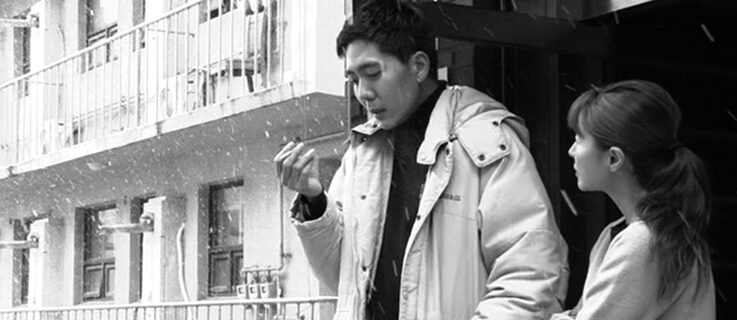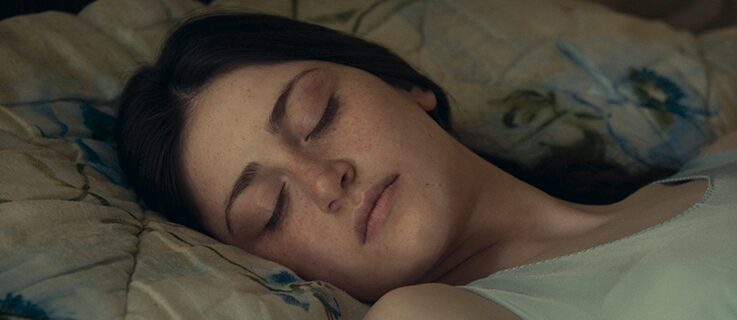Berlinale 2021
A Festival in Tricky Times

„Bad Luck Banging or Loony Porn“ by Radu Jude, Berlinale 2021, Competition | Photo (detail): © Silviu Ghetie / microFilm
A digital industry event in March, an audience event in June – this year's Berlinale has to tread unconventional paths due to the pandemic. It is all the more important that it is being held nonetheless.
By Ula Brunner
No stars, no red carpet and above all: no crowds in front of the cinemas. This year's Berlinale is being held in March without the essential factor that makes it special: its audience. The fact that this, the world's largest public festival, will start as a non-public digital industry gathering and only catch up with its audience months later in June is – of course – thanks to the pandemic.
TRICKY SET-UP
The festival management – Carlo Chatrian and Mariette Rissenbeek – had long hoped to be able to present an in-person festival despite the Corona-related restrictions. It was only shortly before the inevitable second lockdown at the end of 2020 that the decision was made to cancel the traditional February date and to organise the Berlin International Film Festival in two stages. In March, the “industry event” is aimed exclusively at a professional audience. The entire festival programme, including the competition, will be streamed so to speak behind closed curtains, exclusively for the film industry and accredited journalists. Also in March, the six-member jury will announce its Bear decisions, while the award ceremony will in turn be held in the summer, when the films will be screened to a large audience in the city's cinemas. A tricky set-up in tricky times.ARGUMENT: EUROPEAN FILM MARKET
But what would the alternatives have been? Moving the event entirely online and selling tickets for streaming? Not an option for an A-list festival that also thrives atmospherically on film-loving audiences and lively exchange. Cancel the Berlinale altogether? That was never an option, declared Rissenbeek, because filmmakers “absolutely need a platform for their films”.And above all the European Film Market (EFM) offers precisely this platform at the industry event. The film market usually occurs parallel to the Berlinale, unnoticed for the most part by the general public. It is an important trading venue for film buyers, producers and the distribution industry; films are sold and rights are negotiated. As the first market of the year, the EFM is one of the film industry’s three most important gatherings, along with the Marché du Film in Cannes (in May) and the American Film Market (AFM) in Santa Monica, California (in November). The EFM is important for the entire 2021 cinema year – and beyond. The Berlin festival simply cannot afford to do without it.
CULTURE ASSERTS ITSELF
The festival is thus trying to make the best of a situation marked by necessary restrictions. Even more: the Berlinale is another instance of how culture strives to assert itself even in the most difficult of times. 6,318 films were submitted for the 71st Berlinale, only 480 fewer than last year - all of them productions that were shot or completed during the pandemic. However, the number of films in the programme had to be reduced: the curators selected 166 films, normally there are around 400. „Memory Box“ by Joana Hadjithomas & Khalil Joreige, Berlinale 2021, Competition | Photo (detail): © Haut et Court - Abbout Productions - Micro_Scope
„Memory Box“ by Joana Hadjithomas & Khalil Joreige, Berlinale 2021, Competition | Photo (detail): © Haut et Court - Abbout Productions - Micro_Scope
A “LESS GLOOMY” COMPETITION
The competition brings together 15 world premieres. With the exception of the Mexican entry, one Korean, one Japanese and one Iranian Film, they are predominantly European productions. The USA is completely absent from this slimmed-down year. This year's competition is “less gloomy” than last year's, declared Carlo Chatrian at the digital programme presentation, saying it was proof that the filmmakers had dealt with the stressful situation of the pandemic in creative and very personal ways.With four entries, Germany is making a strong showing: Maria Schrader, whose miniseries Unorthodox has just won several awards, is there with her sci-fi comedy Ich bin dein Mensch / I’m Your Man, as is Maria Speth with her long-term observational documentary Herr Bachmann und seine Klasse / Mr. Bachmann and His Class. Two Berlin films are also competing for the Bears: Dominik Graf's novel adaptation Fabian oder Der Gang vor die Hunde / Fabian – Going to the Dogs about Berlin in the 1930s and Nebenan / Next Door, actor Daniel Brühl's autobiographical debut as a director.
FAMILIAR NAMES ...
Introduction was partly shot in Berlin by Hong Sang-soo. The Korean cult director was last in the competition in 2017 with On the Beach at Night Alone. Introduction, a kind of road movie about a young man who wants to visit his family, is his 25th feature film. "Introduction" by Hong Sang-soo, Berlinale 2021, Competition | Photo (detail): © Jeonwonsa Film Co.Production
"Introduction" by Hong Sang-soo, Berlinale 2021, Competition | Photo (detail): © Jeonwonsa Film Co.Production
... AND PREVIOUS BEAR WINNERS
Some previous Bear winners have of course also been invited: Romanian director Radu Jude (Silver Bear for Aferim! in 2015) returns to the competition with Bad Luck Banging or Loony Porn. The film reflects on the social upheavals caused by a leaked sex video. In Forest - I See You Everywhere, Bence Fliegauf, who took a Silver Bear back to Hungary in 2012 for his Just the Wind, assembles seemingly unrelated stories about everyday life and relationships from Budapest.FILMS ON THE DEATH PENALTY ...
This year as well, the Berlinale remains true to its claim to be the most political of the leading festivals. Mexican filmmaker Alonso Ruizpalacios (Silver Bear 2018 for the screenplay of Museum) is showing A Cop Movie, a mix of documentary and feature film about police work in Mexico. From Iran again comes a film about the death penalty: Ballad of a White Cow by Maryam Moghaddam and Behtash Sanaeeha tells the story of a woman whose husband was unjustly executed. Only in 2020 did Iranian Mohammad Rasoulof win a Golden Bear for his film There Is No Evil. Rasoulof, by the way, is a member of the international jury, which this year consists of six previous Bear winners.... AND A MINOR SENSATION
The fact that the German-Georgian co-production Was sehen wir, wenn wir zum Himmel schauen? / What Do We See when We Look at the Sky? made it into the Competition amounts to a minor sensation: Georgian-born Alexandre Koberidze's magical love story is his graduation film at the Deutsche Film- und Fernsehakademie Berlin/DFFB. Such a debut would probably have been better placed at the Max Ophüls Preis film festival than at an international A-list festival such as the Berlinale. „What Do We See When We Look at the Sky?“ by Alexandre Koberidze, Berlinale 2021, Competition | Photo (detail): © Faraz Fesharaki/DFFB
„What Do We See When We Look at the Sky?“ by Alexandre Koberidze, Berlinale 2021, Competition | Photo (detail): © Faraz Fesharaki/DFFB
A SENSUOUS CINEMATIC EXPERIENCE THIS SUMMER?
This much can be said in advance: the festival management has put together a diverse and courageous competition programme. We can therefore look forward to seeing who will take home a Golden or Silver Bear. However, there are no big stars in the main section. They can be seen in the Berlinale Specials: Michelle Pfeiffer in French Exit, Michael Caine in Best Sellers, Tina Turner in the documentary Tina, Jodie Foster and Sherlock star Benedict Cumberbatch in The Mauritanian.How wonderful it would be if the Berlinale were to bring these stars to Berlin in June - and with them that long-missed sensuous festival feeling! Because if the plan works out, the Summer Berlinale would be the first major cultural event in this country since the beginning of the pandemic. Managing director Mariette Rissenbeek then hopes for a “great celebration of cinema”. Who would argue with her?
Comments
Comment